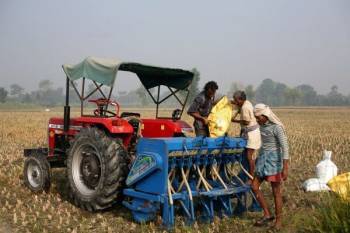NEW DELHI, 13 March 2024: India, a land of vibrant agricultural traditions, finds itself at a critical juncture. The ongoing Ukraine crisis has sent shockwaves through the global food supply chain, and India, with its vast agricultural sector, is both impacted and holds the potential to offer solutions.
This article delves into the complexities of India's agricultural landscape, its role in the global food system, and the challenges and opportunities presented by the current crisis.
A Land of Bountiful Harvests, Yet Rife with Challenges
India boasts the world's largest area under cultivation and is the second-largest producer of agricultural products. From rice, wheat, and pulses to fruits, vegetables, and spices, the country's agricultural sector is a vital source of livelihood for millions of farmers and contributes significantly to its GDP. However, the sector faces several challenges:
- Fragmented Landholdings: A dominant feature is the prevalence of small and fragmented landholdings, hindering economies of scale and mechanized farming practices.
- Climate Vulnerabilities: Erratic rainfall patterns, droughts, and floods pose significant risks to crop yields and agricultural sustainability.
- Limited Irrigation Infrastructure: Despite efforts, a significant portion of agricultural land lacks access to reliable irrigation facilities, impacting productivity.
- Post-Harvest Losses: Inadequate storage facilities and inefficient logistics lead to substantial post-harvest losses, reducing food availability.
The Ukraine Crisis: A Perfect Storm for Global Food Security
The war in Ukraine has disrupted global food supply chains in unprecedented ways. Both Ukraine and Russia are major exporters of wheat, maize, and sunflower oil, accounting for a significant portion of the world's trade in these commodities. The disruption has led to:
- Price Volatility: Global food prices have skyrocketed, putting a strain on import-dependent countries, particularly those in Africa and the Middle East.
- Supply Shortages: The war has impacted planting, harvesting, and export logistics, leading to potential shortages of essential food staples in various regions.
- Geopolitical Tensions: The crisis has heightened concerns about food security and triggered a scramble for alternative suppliers among importing nations.
India's Potential Role: A Beacon of Hope?
India, with its vast agricultural base and surplus production in certain commodities, emerges as a potential solution provider in the face of the global food crisis. Here's how India can contribute:
- Alternative Supplier: India is a significant producer and exporter of rice, the world's most consumed staple food. It can potentially fill some of the gaps left by the disrupted Ukrainian wheat exports.
- Boosting Production: Government initiatives aimed at increasing production of key crops like wheat and pulses can further enhance India's ability to contribute to global food security.
- Strategic Partnerships: India can explore partnerships with food-deficit countries facing shortages due to the Ukraine crisis, ensuring access to essential food supplies.
Challenges and Considerations: Walking a Tightrope
While India's role in mitigating the global food crisis holds promise, several challenges need to be addressed:
- Domestic Food Security: India's own population is vast, and ensuring domestic food security remains a top priority. Balancing exports with meeting domestic needs is crucial.
- Infrastructure Bottlenecks: Addressing existing infrastructure limitations in storage, transportation, and logistics is essential for efficient food exports.
- Price Fluctuations: Managing volatile global food prices requires careful policy interventions to prevent domestic inflation and protect Indian consumers.
The Path Forward: A Multi-Pronged Approach
India's response to the global food crisis necessitates a multi-pronged approach:
- Investing in Agriculture: Increased investment in agricultural infrastructure, research and development, and farmer support services is crucial for long-term growth and resilience.
- Promoting Sustainable Practices: Encouraging climate-smart agriculture practices and efficient water management techniques is essential for long-term sustainability.
- Strengthening International Cooperation: Building strong partnerships with importing nations and international organizations can foster a more stable and equitable global food system.
Conclusion: A Catalyst for Change?
The Ukraine crisis serves as a stark reminder of the interconnectedness of the global food system. India, with its agricultural potential and strategic importance, has a unique opportunity to play a leading role in ensuring global food security. However, navigating this complex situation requires a careful balancing act, addressing domestic needs while strategically contributing to the global response. By investing in agriculture, fostering sustainability, and strengthening international cooperation, India can emerge from this crisis as a leader in building a more resilient and equitable global food system.
Image credit: quora.com























